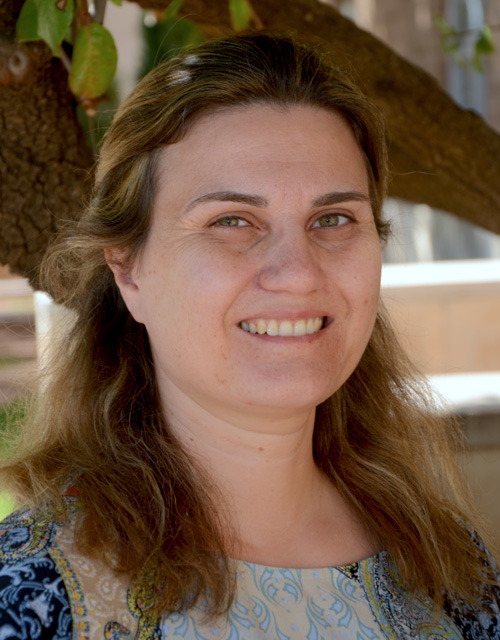Martina Inge Klein, Ph.D.
Email: martina.i.klein@ttu.edu
Phone: (806) 834-4745
Office: 317, Lab: B13, B13A, B15
Education:
Ph.D., 2008, University of Cincinnati (Experimental/Human Factors Psychology)
M.A., 2004, University of Cincinnati (Experimental/Human Factors Psychology)
B.A., 2001, Hawaii Pacific University (Major: Psychology, Minor: Mathematics)
Dr. Klein will be reviewing applications for the incoming 2023-2024 class.

Research Interests
Perceptual-motor distortions, stress, and mental workload in the laparoscopic training
environment
Laparoscopic surgery, a minimally invasive surgical approach, requires surgeons to
view the target tissue on a monitor via a camera (i.e., laparoscope) that is partially
inserted into the patient. Surgeons manipulate the target tissue using long, thin
instruments that are also partially inserted into the patient. The laparoscopic environment
poses perceptual-motor distortions for surgeons, including a disruption of the hand-eye
mapping that occurs when the camera is located to the surgeon's side to obtain a better
view of the target tissue. The aims of this line of research are threefold:
- Determine whether basic perceptual-motor distortion theories generalize to novices in the laparoscopic training environment.
- As the experience of mental workload and mental stress might interfere with skill acquisition and performance, my research team assesses the mental workload (attentional load) and mental stress experienced by novices in the laparoscopic environment.
- Third, the long-term goal of this research is to develop laparoscopic training programs/modules.
Nature exposure and its impact on attention restoration
Prior research has indicated that nature interventions are effective for restoring
our cognitive (attentional) resources (see Kaplan, 1995). Such interventions are not
limited to actual nature immersions, but are also effective when utilizing digital
nature pictures. However, certain other image characteristic might result in more
effective interventions. Thus, the goals of this line of research are:
- Determine image characteristics that result in more effective digital nature interventions.
- Identify the limitations of digital nature interventions. For example, individual differences like anxiety, ADD/ADHD and depressive symptomatology may interfere with attention restoration.
Research Support
- Agency for Healthcare Research and Quality (AHRQ)
- Association for Surgical Education
- Intuitive Surgical, Inc.
Selected Research
- Klein, M. I., Wheeler, N. J., & Craig, C. (2015). Sideways camera rotations of 90° and 135° result in poorer performance of laparoscopic tasks for novices. Human Factors, 57, 246-261.
- Craig, C., Klein, M. I., Menon, C. V., & Rinaldo, S. B. (2015). Digital nature benefits typical individuals but not individuals with depressive symptoms. Ecopsychology, 7, 53-58. doi:10.1089/eco.2014.0057
- Craig, C., Klein, M. I., & Rinaldo, S. B. (2015). Oxygenation of the prefrontal cortex during sequential planning in the tower of London. Proceedings of the Human Factors and Ergonomics Society Annual Meeting, 59, 115-119.
- Craig, C., Klein, M. I., Griswold, J., Gaitonde, K., McGill, T., & Halldorsson, A. (2012). Using cognitive task analysis to identify critical decisions in the laparoscopic environment. Human Factors, 54, 1025-1039. doi:10.1177/0018720812448393
- Klein, M. I., Warm, J. S., Riley, M. A., Matthews, G., Doarn, C., Donovan, J. F., & Gaitonde, K. (2012). Mental workload and stress perceived by novice operators in the laparoscopic and robotic minimally invasive surgical interfaces. Journal of Endourology, 26, 1089-1094. doi:10.1089/end.2011.0641
- Klein, M. I., Warm, J. S., Riley, M. A., Matthews, G., Gaitonde, K., & Donovan, J. F. (2008). Perceptual distortions produce multidimensional stress profiles in novice users of an endoscopic surgery simulator. Human Factors, 50, 291-300. doi:10.1518/001872008X288312
Accomplishments and awards won by graduate students working in my lab
|
Graduate Student |
Accomplishment/Award |
|
Curtis Craig (alumnus) |
|
|
Brittany Neilson |
|
|
Theresa Nguyen |
|
Teaching
Graduate Courses:
- Experimental Design
Undergraduate Courses:
- Intermediate Undergraduate Statistics
- Biological Basis of Behavior
Psychological Sciences
-
Address
Texas Tech University, Department of Psychological Sciences, Box 42051 Lubbock, TX 79409-2051 -
Email
kay.hill@ttu.edu
